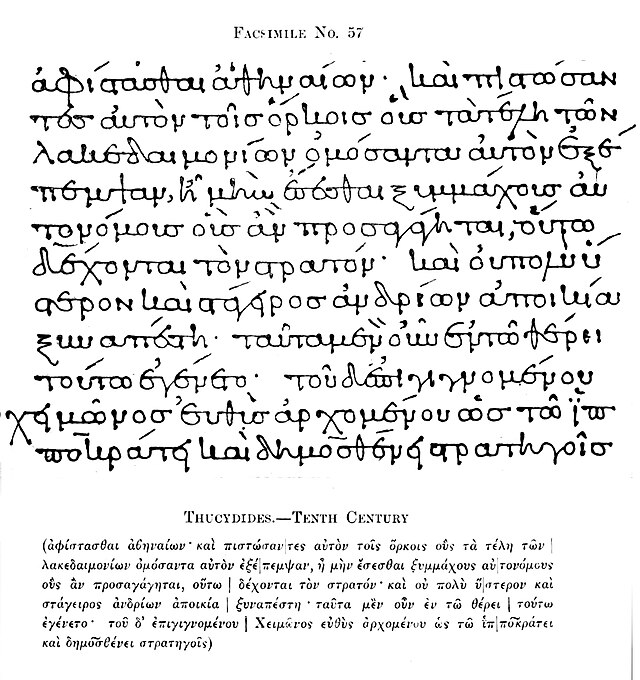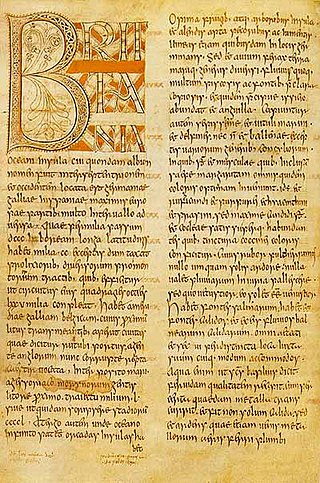Historiography
umbrella term referring to a) any body of historical work and b) the study of the methods of historians in developing history From Wikipedia, the free encyclopedia
Remove ads
Historiography is about the writing of history and the use of historical methods. Thus it looks at authors, sources, interpretation, style, bias, and audience. It is sometimes called "the history of history". The word historiography can also refer to a body of historical work.
This page or section needs to be cleaned up. The specific problem is: February 2025. |
Written history
For thousands of years people have been telling stories about the past, and making written records of the actions of kings and prophets and other famous persons. After 500 BC, they began writing more organized histories.
Hellenic world

Written history appeared first with the ancient Greeks, whose historians greatly contributed to the development of historical methodology. The very first historical works were The Histories composed by Herodotus of Halicarnassus (484 BC–ca.425 BC), who became later known as the 'father of history' (Cicero). Thucydides was the first to distinguish between cause and immediate origins of an event, and his successor Xenophon (ca. 431–355 BC) introduced autobiographical elements and character studies in his Anabasis.
Roman world
The Romans adopted the Greek tradition, becoming the first people to write history in a non-Greek language. The most famous writers are Julius Caesar's (100 BC–44 BC) Bellum Gallicum. Livy (59 BC–AD 17) who records the rise of Rome from city-state to world dominion.[1] Plutarch (c. 46 - 127) and Suetonius (c. 69-after 130) introduced biography as a branch of history. Tacitus (c. 56–c. 117) criticizes Roman immorality by praising German virtues.
Medieval Europe

Writing history was popular among Christian monks and clergy in the Middle Ages. They wrote about the history of Jesus Christ, the Church and of their patrons, the dynastic history of the local rulers. In the Early Middles Ages historical writing often took the form of annals or chronicles recording events year by year but this style tended to hampered the analysis of events and causes.[2]
An example of this type of writing are Anglo-Saxon Chronicles which were the work of several different writers and start during the reign of Alfred the Great in the late 9th century and one copy of which was still being updated in 1154.
History was written about states or nations during the Renaissance. The study of history changed during the Enlightenment and Romanticism. Voltaire described the history of certain ages that were important according to him, instead of describing events in a chronological order. History became an independent discipline. It was not called philosophia historiae anymore, but merely history (historia).
Modern era
Modern historiography began with Leopold Ranke in the 19th century, who was very critical on the sources used in history. The French Annales School radically changed history during the 20th century. Fernand Braudel wanted history to become more scientific by demanding more mathematical evidence in history, in order to make the history discipline less subjective.
Furthermore, he added a social-economic and geographic framework to answer historical questions. Other French historians, like Philippe Ariès and Michel Foucault described history of daily life topics such as death and sexuality. They wanted history to be written about all topics and that all questions should be asked.
Historical journals
Historical journals for academic historians to exchange ideas started in the nineteenth century. The early journals were similar to the academic journals used in the physical sciences, and were seen as a means by which history could be professionalised.
Journals also helped historians to establish various historiographical approaches, the most notable example of which was Annales. Économies. Sociétés. Civilisations. a publication instrumental in establishing the Annales School.
- 1840 Historisk tidsskrift (Denmark)
- 1859 Historische Zeitschrift (Germany)
- 1866 Archivum historicum, later Historiallinen arkisto (Finland, published in Finnish)
- 1871 Historisk tidsskrift (Norway)
- 1876 Revue Historique (France)
- 1881 Historisk tidskrift (Sweden)
- 1886 English Historical Review (UK)
- 1895 American Historical Review (USA)
- 1914 Mississippi Valley Historical Review (renamed 1964 the Journal of American History) (USA)
- 1916 The Journal of Negro History
- 1916 Historisk tidskrift för Finland (Finland, published in Swedish)
- 1918 Hispanic American historical review
- 1928 Scandia (Sweden)
- 1929 Annales. Économies. Sociétés. Civilisations
- 1952 Past & present: a journal of historical studies (Great Britain)
- 1953 Vierteljahrshefte für Zeitgeschichte (Germany)
- 1956 Journal of the Historical Society of Nigeria (Nigeria)
- 1960 Journal of African History (Cambrid
- 1960 Technology and culture: the international quarterly of the Society for the History of Technology (USA)
- 1975 Geschichte und Gesellschaft. Zeitschrift für historische Sozialwissenschaft (Germany)
- 1976 Journal of Family History
- 1982 Storia della Storiografia — History of Historiography — Histoire de l'Historiographie — Geschichte der Geschichtsschreibung Archived 2015-12-16 at the Wayback Machine
- 1982 Subaltern Studies (Oxford University Press)
- 1986 Zeitschrift für Sozialgeschichte des 20.und 21. Jahrhunderts, new title since 2003: Sozial.Geschichte. Zeitschrift für historische Analyse des 20. und 21. Jahrhunderts (Germany)
- 1990 Gender and history
- 1990 L'Homme. Zeitschrift für feministische Geschichtswissenschaft (Austria)
- 1990 Österreichische Zeitschrift für Geschichtswissenschaften (ÖZG)
- 1992 Women's History Review
- 1993 Historische Anthropologie Archived 2009-09-11 at the Wayback Machine
Remove ads
Approaches
The question of how a historian approaches historical events is one of the most important questions within historiography. It is commonly recognised by historians that, in themselves, individual historical facts are not particularly meaningful.
Such facts will only become useful when assembled with other historical evidence, and the process of assembling this evidence is understood as a particular historiographical approach. Some of the more common historigraphical approaches are:
- Oral history
- Annales School
- Deconstruction
Determinism
Determinism means that historians view history as being caused more by certain factors than by other factors. The two most common types of determinism are geographic determinism and economic determinism.
Geographic determinism means that historians think history is mostly caused by geography. Frederick Jackson Turner was a proponent of geographic determinism.
Economic determinism means that historians think history is mostly caused by economics. Charles Beard was a proponent of economic determinism.
Other historians believe that history is caused mostly by politics or mostly by a struggle for natural rights, but these are usually not labeled as determinism.
Remove ads
Bibliography
Theory and philosophy
- R.G. Collingwood, The Idea of History, 1936, ISBN 0-19-285306-6
- W.H. Walsh, An Introduction to Philosophy of History, 1951.
- E. H. Carr, What is History? 1961, ISBN 0-394-70391-X
- Marc Bloch, The Historian's Craft [[[Circa|c.]] 1940]
- Geoffrey Elton, The Practice of History, 1969, ISBN 0-631-22980-9
- Arthur Marwick, The Nature of History, 1970, ISBN 0-333-10941-4
- David Hackett Fischer, Historians' Fallacies: Towards a Logic of Historical Thought, Harper & Row, 1970.
- Hayden White, The Content of Form: Narrative Discourse and Historical Representation, 1987, ISBN 0-8018-4115-1
- Keith Jenkins, Rethinking History, 1991, ISBN 0-415-30443-1
- Peter Burke, History and Social Theory, Polity
- Frank Ankersmit (ed), A New Philosophy of History, 1995, ISBN 0-226-02100-9
- Richard J. Evans In Defence of History, 1997, ISBN 1862071047
- Michael Bentley, Modern Historiography: An Introduction, 1999 ISBN 0-415-20267-1
Press, Oxford
- Alun Munslow. The Routledge Companion to Historical Studies (2000)
- John Tosh, The Pursuit of History, 2002, ISBN 0-582-77254-0
- Keith Jenkins, ed. The Postmodern History Reader (2006)
Histories of historical writing
- Geoffrey Barraclough, History: Main Trends of Research in the Social and Human Sciences, (1978)
- Susan Kinnell, Historiography: An Annotated Bibliography of Journal Article, Books and Dissertations, 1987, ISBN 0-87436-168-0
- Arnaldo Momigliano, The Classical Foundation of Modern Historiography, 1990, ISBN 0-520-07870-5
- Ernst Breisach, Historiography: Ancient, Medieval and Modern, 2nd edition, 1994, ISBN 0-226-07278-9
- H. Floris Cohen, The Scientific Revolution: A Historiographical Inquiry, Chicago, 1994, ISBN 0-226-11280-2
- Michael Bentley (ed.), Companion to Historiography, Routledge, 1997, ISBN 0-415-28557-7 990pp; 39 chapters by experts
- Philippe Poirrier, Aborder l'histoire, Paris, Seuil, 2000.
- Mark T. Gilderhus, History an Historiographical Introduction, 2002, ISBN 0-13-044824-9
- Philippe Poirrier,Les enjeux de l'histoire culturelle, Paris, Seuil, 2004.
- Georg G. Iggers, Historiography in the 20th Century: From Scientific Objectivity to the Postmodern Challenge (2005)
- Lloyd Kramer and Sarah Maza, eds. A Companion to Western Historical Thought Blackwell 2006. 520pp; ISBN 978-1-4051-4961-7.
Feminist historiography
- Mary Ritter Beard, Woman as force in history: A study in traditions and realities
- Gerda Lerner, The Majority Finds its Past: Placing Women in History, New York: Oxford University Press 1979
- Bonnie G. Smith, The Gender of History: Men, Women, and Historical Practice, Harvard UP 2000
- Mary Spongberg, Writing women's history since the Renaissance, Palgrave Macmillan, 2002
- Judith M. Bennett, History Matters: Patriarchy and the Challenge of Feminism, University of Pennsylvania Press, 2006
Thematic and regional
- John Ernest. Liberation Historiography: African American Writers and the Challenge of History, 1794-1861. University of North Carolina Press, 2004
- Frank Farrell. Themes in Australian History: Questions, Issues and Interpretation in an Evolving Historiography (1990)
- Marc Ferro, Cinema and History, Wayne State University Press, 1988
- R. Darcy and Richard C. Rohrs, A Guide to Quantitative History (1995)
- Hudson, Pat. History by Numbers: An Introduction to Quantitative Approaches (2002)
- James W. Loewen, Lies My Teacher Told Me: Everything Your American History Textbook Got Wrong, Touchstone Books 1996
- Tessa Morris-Suzuki, The Past Within Us: Media, Memory, History, 2005, ISBN 1-85984-513-4
- Gary Nash, Charlotte Crabtree, and Ross Dunn. History on Trial: Culture Wars and the Teaching of the Past, (2000)
- Peter Novick, That Noble Dream: The "Objectivity Question" and the American Historical Profession (1988), ISBN 0-521-34328-3
- Thomas Söderqvist. The Historiography of Contemporary Science and Technology (1997)
- Sommer, Barbara W. The Oral History Manual (2003)
- Jan Vansina, "Oral Tradition as History," University of Wisconsin Press, Madison, 1985
- Yerushalmi, Yosef Hayim. Zakhor: Jewish History and Jewish Memory (1982)
Journals
- Cromohs — cyber review of modern historiography Archived 2017-12-28 at the Wayback Machine
- History and Theory
- History of Historiography Archived 2015-12-16 at the Wayback Machine
Remove ads
Related pages
References
Wikiwand - on
Seamless Wikipedia browsing. On steroids.
Remove ads